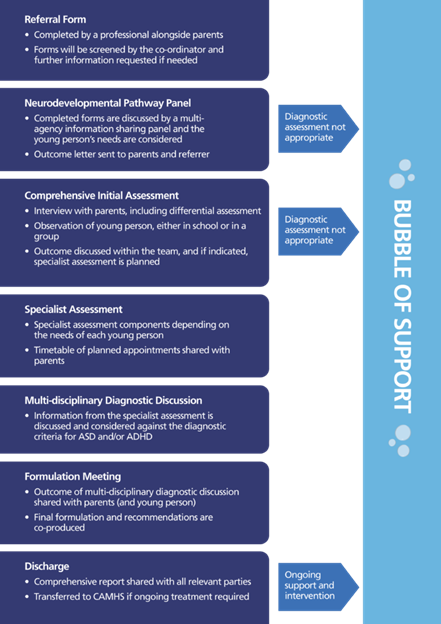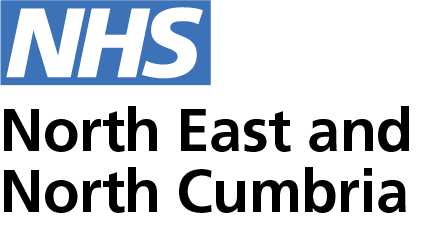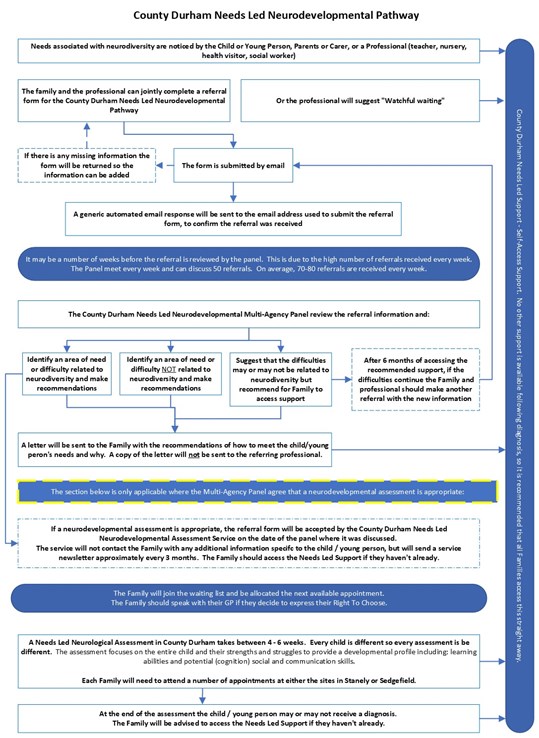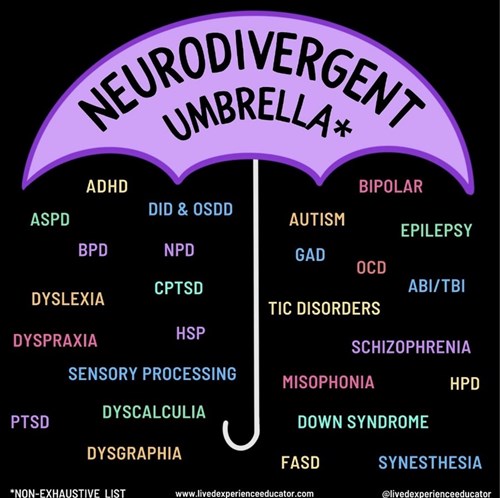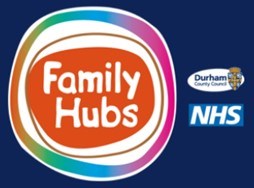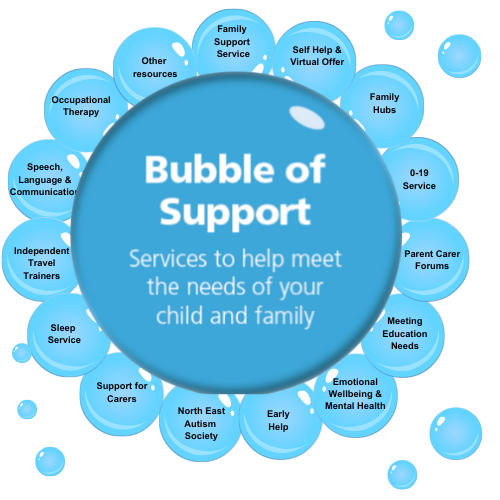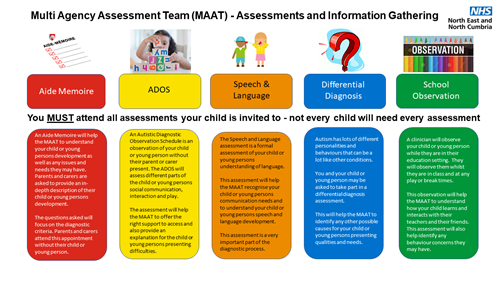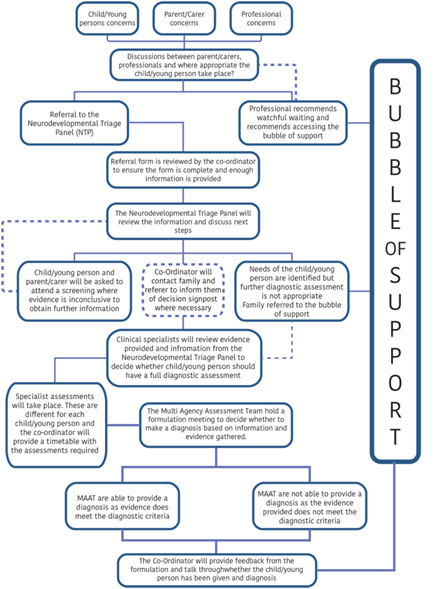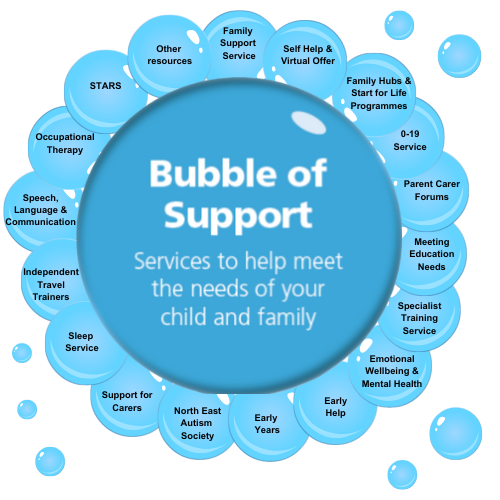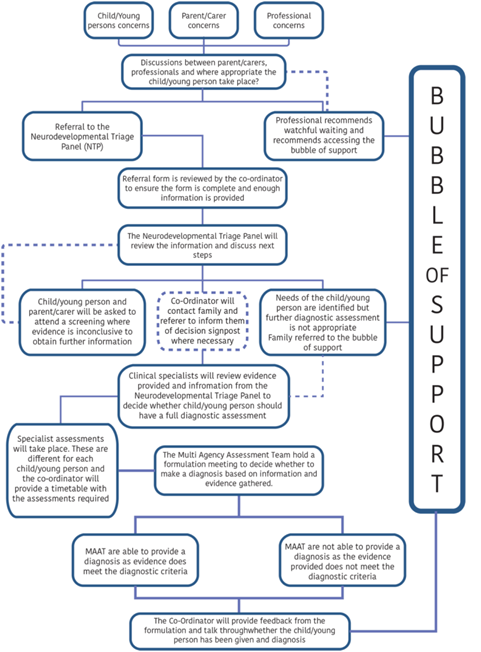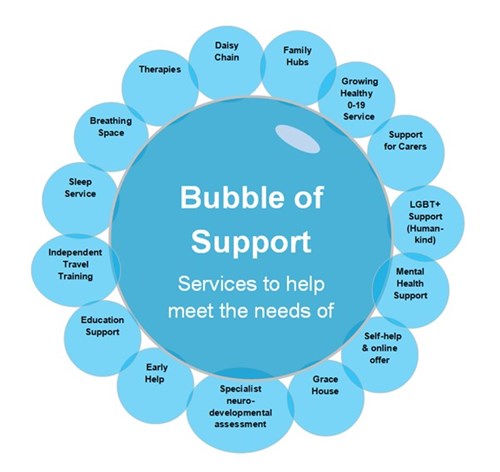Across Darlington, we have a ‘needs led’ neurodevelopmental pathway as we want to make sure you and your child are supported as much as possible, if you or a professional thinks that your child has a neurodevelopmental need. These are needs which are associated with Autism Spectrum Disorder (ASD) and Attention Deficit Hyperactivity Disorder (ADHD).
We have created a ‘bubble of support’ across your local area with many services which can offer advice, guidance or support. There is also a very active Parent Carer Forum which can offer peer support. Details of all the support available is listed below. There is also a comprehensive ‘virtual’ offer which provides alternative websites and support tips for you to try at home.
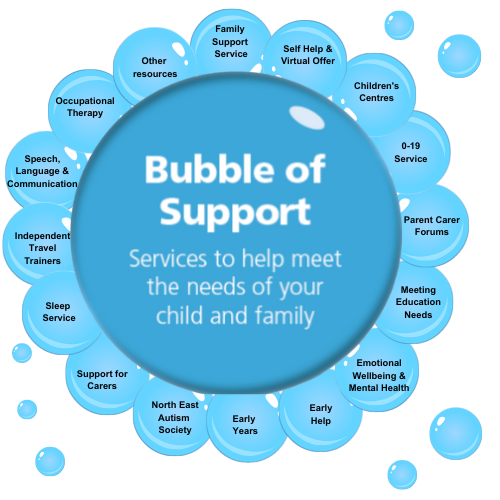
If you live in the Tees Valley, the Family Support Service, delivered by Daisy Chain, is here for you. The team supports children and young people aged 0-18 years and their families, no matter where they are on their Autism, ADHD, Sensory Processing or Foetal Alcohol Spectrum Disorder (FASD) journey. This means that your child or young person does not need to have a diagnosis or be on the neurodevelopmental pathway to access support from the service. The Family Support team is here to listen to your concerns and offer support.
Click here to find out more about the Family Support Service.
Details of the family support service drop-in sessions for local families can be found here.
Please take time to look through the Self Help and Virtual Offer advice and guidance as there are various organisations, websites, and videos for you to access. All have been recommended by NHS England and the Regional Parent Carer Forum. Please take time to explore all the information provided, as there are a selection of strategies, activities, and webinars for you to access.
The SEND Local Offer is for families, children and young people with special educational needs and disabilities from birth to 25 years old. It provides local information, advice and support about education, health & social care. Each Local Authority have a local offer:
To access the local offer for Darlington Click Here
The Challenging Behaviour Foundation have made all their videos about managing behaviour that challenges available online. Please visit the following links to view these videos:
Video challenging behaviour
Challenging Behaviour Foundation.
The Challenging Behaviour website also offers lots of helpful advice and guidance for parents, carers, and professionals.
Positive Behavioural Support (PBS) is an evidence-based approach which is recognised as best practice in supporting people with learning disabilities and behaviours that challenge. The overall goal is to improve a person’s quality of life and the lives of people around them and minimise the chances of behaviour that challenges happening in the first place.
The North East and Cumbria PBS Steering Group has worked with partners from across the health and care sector, including Northumbria University to develop a website which provides information and resources to support families around PBS on upcoming events, courses and latest news. For more information please visit here.
Below is the link to a short film created to showcase the co-production of Positive Behaviour Support (PBS) training for parents of children with a learning disability, autism, or both. The project has been created by parents who work at Skills for People working alongside North East and Cumbria PBS Community of Practice. The film was made by Beacon Films and funded by an NHS England / NHS Improvement, sharing, and celebrating patient and public involvement in the Healthcare Community Grant.
The video (with subtitles) can be accessed here.
Returning to School: The following webinar, delivered by colleagues from NHS Cumbria, Northumberland & Wear (CNTW) and NHS Tees Esk & Wear Valley (TEWV) Foundation Trusts, provides families with support and strategies for managing behaviour and worry when returning to school.
Autism Central
This is a new programme, co-designed to provide high-quality and accessible autism information, education and coaching for families, and carers, and co-delivered by autistic people, families and carers. Autism Central has been commissioned by NHS England’s Workforce, Training and Education Team and is delivered nationally by nine not-for-profit organisations.
Find out more about the project and apply here.
Understanding Autism
The following website can give everyone a better understanding of what autism is, for more information please visit here.
Transformed children centres in local authority areas ensure all families can access the support they need. The programmes will:
- provide support to parents and carers so they are able to nurture their babies, children and young people, improving health and education outcomes for all
- contribute to a reduction in inequalities in health and education outcomes for babies, children, young people and families across by ensuring that support provided is communicated to all parents and carers, including those who are hardest to reach and/or most in need of it
- build the evidence base for what works when it comes to improving health and education outcomes for babies, children, young people and families in different delivery contexts
For more information and how to access children centres in Darlington, please visit here.
The 0-19 Service is a team of specialist public health nurses that include health visitors and school nurses. The roles of this team are to protect and promote the health and wellbeing of children and young people aged from birth to 19 years old. More information can be found by visiting Darlington 0-19 team.
Parent Carer Forums work in partnership with Health and Social Care to ensure that the voices of parents and carers of children and young people are heard. The parent carer forums will also offer support, advice, and guidance to families with Children and Young People with Special Educational Needs and Disabilities (SEND). To access your local parent carer forum please visit:
The Darlington Parent Carer Forum
To access regional parent carer forum information please visit here.
A child or young person has special educational needs if they have a learning problem or disability that make it more difficult for them to learn than most children their age. They may have problems with schoolwork, communication, or behaviour.
Parents can get Special Educational Needs (SEN) help and advice by visiting:
Darlington SENCO information
Education settings, health, and social care services, together with parents, carers and peers play a key role in supporting Children and Young People’s Emotional Health and Wellbeing and can have a significant impact on the overall experiences and life outcomes for our children. Very few children will need specialist intervention by a clinical service/mental health professional. Locally across Darlington, Emotional Wellbeing and Mental Health support services are provided by the following. Please take your time to visit the following links to ensure you access the right support for your child, young person, and family. The Child and Adolescent Mental Health Services (CAMHS) across Darlington has a single point of access for referrals and self-referrals.
Single Point of Contact (SPOC) is a service available to anyone with concerns including parents, carers, school staff, health professionals and GPs, and children and young people worried about their own mental health. You will be able to chat with a mental health nurse about your worries and concerns and the nurse can then consider the most appropriate next steps to best support the child or young person. Help and support can come in many forms, including self-help guidance, signposting to appropriate support services in the voluntary and third party sectors, or referral into the Child and Adolescent Mental Health Services (CAMHS). For further information please visit Community mental health teams for children and young people in Darlington.
Mental Health Support in schools – can provide early support for children and young people (5-18 years) through education. Supporting schools, young people, and families, the mental health support in schools will target education settings across Darlington.
Please check the following link to see if your child’s school is involved Mental health support teams in schools
Further information for parents can be accessed by visiting here.
Young people can access this support through education and by contacting either Alliance or school’s mental health and wellbeing lead direct. Young people can self-refer via an online e-referral process and parent and carers can also refer on their behalf. A response is aimed for within 24 hours of referral being made. For further information and how to access use the following:
E-Referral or Instagram @alliancemhst
Child and Adolescent Mental Health Services Crisis Team – offer 24/7 support for children and young people in mental health crisis. Call 08000 516171 or visit the website at CAMHS crisis and liaison service.
MIND is a Mental Health charity in Darlington with the aim that everyone in the local area has good mental health. The charity works with all individuals across all communities to ensure they can access support to improve their emotional wellbeing. For further information please visit here.
The North East & North Cumbria Child Health & Wellbeing Network works to bring organisations together to design and deliver joined up services to provide improved outcomes for children and young people. For more information please visit here.
Below are a list of national resources and information for families to access:
This May Help – Children’s Mental Health Advice for Parents and Carers
This May Help, is a new national initiative providing mental health advice to parents and carers. This May Help is aimed at parents and carers who may have concerns about their child’s mental health and is part funded by the Quality Improvement Taskforce for Children and Young People’s Mental Health, Learning Disability and Autism Inpatient Services.
The website gives easy-to-follow advice to help families manage their child’s mental health. This advice was developed by NHS professionals and parents who’ve been through their own child’s mental health journey. Parents and carers have shared advice that helped them and that may also help other families. Professionals who work with children and young people are also being encouraged to use the website.
The advice covered on This May Help includes, self-harm, gaming and online activity, teenagers’ safety, eating disorders, school avoidance, understanding mental health, understanding teenagers, online threats, building rapport, building resilience, building a support network, self-care tips, managing an emergency, managing in a crisis, and preparing for a children and adolescent mental health services (CAMHS) appointment.
These subjects were chosen by families and young people who have gone through their own mental health challenges. Gary Lineker, Myleene Klass, and Tanni Grey-Thompson are amongst 16 presenters featured in the films. Please click here to access more information.
Anna Freud National Centre for Children and Families – provides research, developing clinical practice and policy and workforce development nationally, working to support families of children and young people with mental disorders and associated challenges by developing resilience and supporting to manage these challenges. Visit AnnaFreud website for further information.
Kooth is a free, online forum and counselling/mental health support for young people aged 11+. Visit Kooth to find out more. QWELL is a free, online and counselling/mental health support for adults. Visit Qwell to find out more.
Recovery College Online provides free resources to help support people struggling with mental health difficulties. Visit the recovery college online to find out more.
Childline – free, private, and confidential service where children can talk about anything. Visit Update from Childline
Shout 85258 – free, confidential, 24/7 text messaging support service for anyone who is struggling to cope. Visit here.
WeheartCBT – free CBT resources to help schools, parents and professionals support children with mental health difficulties. Visit here or on Twitter @WeHeartCBT
The Learning Disability Matters website for families has a range of resources to support family resilience and health and wellbeing of children and young people with a learning disability.
The Early Help team provide support to a family when a problem emerges, at any stage in a child or young person’s life, from the foundation years through to the teenage years. For more information visit:
Early Help for Darlington.
Early Years is a team of skilled and experienced specialist staff that provide specialist home support for very young children with complex needs. Find out more here.
The North East Autism Society (NEAS) is a registered charity that work together to inspire, support, celebrate and equip autistic and neurodivergent people to fulfil their potential in life. The organisation offers a wealth of knowledge to support families living with autism.
For more information please visit North East Autism Society.
Carer support services provide a range of different services to help support adults, children and young people who are in a caring role. More information can be found by visiting the following links:
Support for young carers and young adult carers and/or support for adults
The Tees Valley Sleep service supports families who have a child with any additional needs by using a tiered approach offering support, resources, workshops and assessments.
For more information please visit Tees Valley Sleep Service
Independent travel training is tailored and practical help for people to travel by public transport, on foot or by bike. It aims to help children and young people travel independently and without fear so they can get to school or college, work and for social and leisure activities.
For Darlington, please visit here.
The Speech and Language Therapy service work with children and young people who have a speech, language and communication needs or difficulties with eating, drinking, and swallowing.
As well as working with children and young people the service also provide support to families and carers, teachers, and other adults around them. The service aims to develop their best possible communication skills, considering their individual abilities and needs.
Speech and Language Therapy in Darlington is provided by North Tees and Hartlepool Foundation Trust Speech and language therapy for children.
Other speech, language and communication resources you might find useful:
South Tees Hospital NHS Foundation Trust Paediatric Speech & Language Therapy
South Tees NHS Speech Therapy YouTube channel
BBC website ‘Tiny Happy people’
Occupational Therapy offer a team of specialist therapists and assistant therapists to provide assessment, treatment and advice to children, young people, and their families in a range of locations including home, school or hospital clinics. The service will assess and treat children and young people who have long term health needs or problems with movement and co-ordination. The service will make sure your child reaches their potential and works alongside professionals involved with the child or young person to ensure a holistic approach to treatment and assessment.
In Darlington this service is provided by County Durham and Darlington NHS Foundation Trust, further information can be found by visiting here.
Sensory ideas for the home
A recorded webinar has been developed by an Occupational Therapist to outline tips and guidance for supporting children and young people with sensory needs within the home.
Check out the following website for useful ideas, top tips and information for children's occupation therapy.
North Tees Autism information and guidance
Darlington Borough Council Early Years and childcare
Attention Deficit Hyperactivity Disorder
Foetal Alcohol Spectrum Disorders
The Neurodevelopmental Pathway Team
A team has been developed specifically to co-ordinate the assessments and support which a child and their family might need whilst undergoing an assessment for ASD and ADHD. The service is provided by Tees, Esk & Wear Valleys NHS Foundation Trust (TEWV) and is for children aged between 5 and 18 who are registered with a GP in Darlington.
The team aims to support young people, parents and carers as much as possible throughout their assessment process and is happy to offer support and advice. For any additional information, please contact tewv.darlingtonneuro@nhs.net
For children aged under 5, the referral route remains the same with all children seeing a paediatrician. However, please speak to your health visitor for further advice and support and access the services available through the Bubble of Support.
Additional Information
The following documents include a guide on how to refer your child and the Referral form:
County Durham and Darlington Neurodevelopmental Assessment Pathway Additional Information
